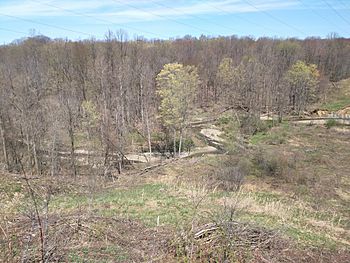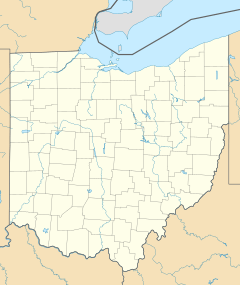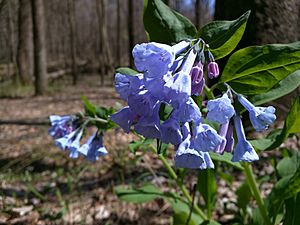Big Creek (Geauga County, Ohio) facts for kids
Quick facts for kids Big Creek |
|
|---|---|

The upper reaches of Big Creek near Chardon
|
|
|
Location of the mouth within Ohio
|
|
| Country | United States |
| State | Ohio |
| Physical characteristics | |
| Main source | Chardon 1,130 ft (340 m)From USGS Chardon, Ohio topographical map 41°35′32″N 81°11′21″W / 41.592159°N 81.189272°W |
| River mouth | Grand River 610 ft (190 m)from USGS ArcGIS web application. 41°42′26″N 81°13′48″W / 41.7072675°N 81.2301013°W |
| Length | 15.6 mi (25.1 km) |
| Basin features | |
| Basin size | 50 sq mi (130 km2) |
Big Creek is a stream in Ohio, USA. It is about 15.6-mile-long (25.1 km). The creek flows into the Grand River. You can find Big Creek in Lake and Geauga counties.
The creek starts near Chardon, Ohio. It flows through areas shaped by ancient glaciers. Along its path, Big Creek cuts through old rock layers. These layers show fossils from a very long time ago, called the Paleozoic Era. Big Creek joins the Grand River in Painesville Township. This meeting point is inside Helen Hazen Wyman Park.
Big Creek has a watershed of about 50 square miles (130 km2). This means it collects water from a large area. Several smaller streams flow into Big Creek. These include Cutts, Jenks, Aylworth, East, Gordon, and Kellogg Creeks. In the past, Big Creek was also known as Bigg Creek or West Creek.
Many parks are located along Big Creek. It's a popular spot for fishing. People often catch smallmouth bass and steelhead trout here. These fish come to the creek to lay their eggs.
Contents
History of Big Creek Valley
The Big Creek valley is now a great place for outdoor fun. You can go hiking, fishing, and camping there. But a long time ago, it was a busy industrial area. There were sawmills, iron factories, and a leather tannery.
Liberty Hollow and the Underground Railroad
One of the mills belonged to Eber Howe. He was a local newspaper editor. He also worked to end slavery. His mill became a secret stop on the Underground Railroad. This was a network of safe houses. Enslaved people used it to escape to freedom in Canada. They would cross Lake Erie from Painesville. Because this route helped people find liberty, the mill became known as Liberty Hollow.
Other Historic Sites
Another area was called Pease Hollow. It's now near Cascade Road and Girdled Road. David Pease built a mill there. This mill used water power to run machines. These machines helped make furniture and other small wooden items.
Griswold Hollow is another historic spot. It's along Clark Road. A small sandstone quarry was once located there. This quarry was next to Jenks Creek. Geologists even noted it in a survey from 1912.
Nature and Wildlife
Big Creek flows through three large forested parks. The land around the creek is hilly. Many small streams flow into Big Creek. These streams have steep banks. In some places, the creek has cut deep into the ground. This creates beautiful overlooks.
Plants and Trees
The low, wet areas near the creek have certain trees. You can find sycamore and cottonwood trees there. On the higher, drier hilltops, you'll see different trees. These areas are home to Beech-Maple forests. You might also spot red oak, hemlock, and hickory trees. In the spring, the forests are full of colorful wildflowers. Look for trilliums and bluebells.
Animals and Birds
The forests around Big Creek are home to many animals. You can often see white-tailed deer and turkeys. Other common animals include:
- Red squirrels
- Gray squirrels
- Black squirrels
- Flying squirrels
- Fox squirrels
- Raccoons
- Opossums
- Foxes
- Coyotes
Sometimes, black bears have been seen in nearby areas. Along the creek, you might spot kingfishers and wood ducks. Swallows build their nests in the creek banks. Many types of woodpeckers live in the forest. These include pileated, red-bellied, hairy, and downy woodpeckers. You can often hear them tapping on trees.



